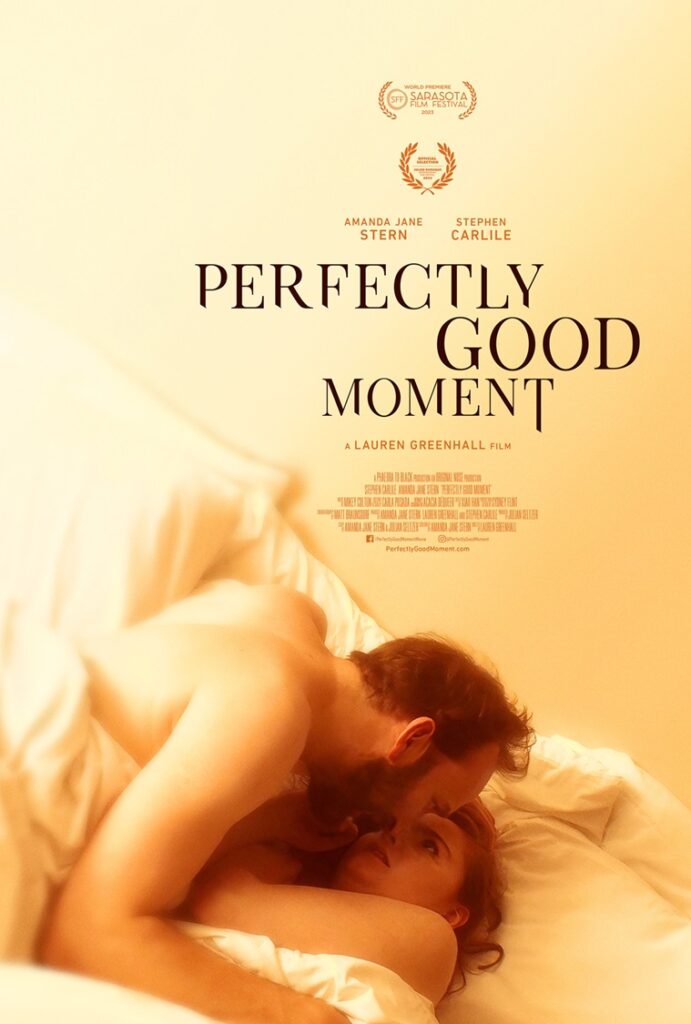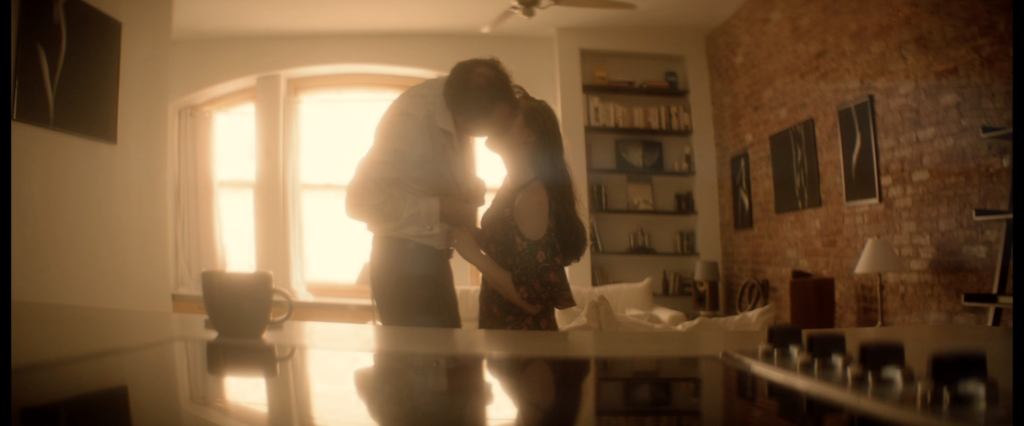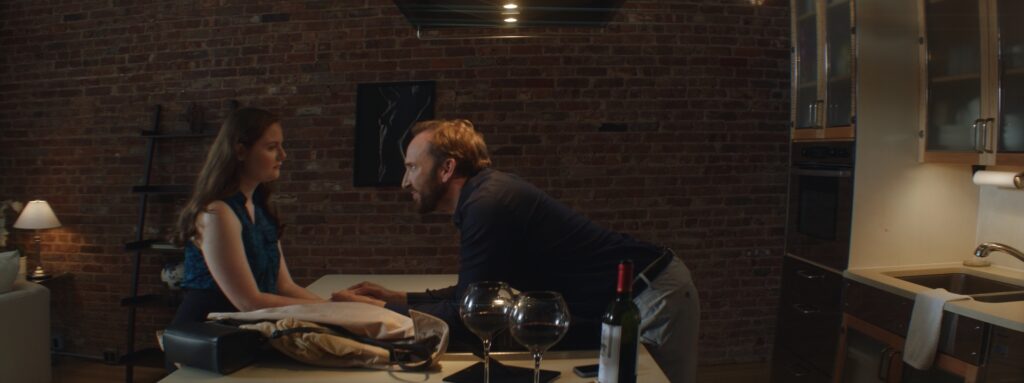
Letterboxd can build some bad habits. Sure, it can be a great tool for keeping track of what you watch and your immediate thoughts and what your friends are watching, but its gamified interface prioritizes immediacy over anything else. It’s why we get so many pithy, quippy Letterboxd reviews. This is all to say I recently watched PERFECTLY GOOD MOMENT, directed by Lauren Greenhall, and found my reaction to actor Stephen Carlile shifting the longer I sat with the film. Things aren’t always as they immediately seem, which is a great jumping-off point for discussing PERFECTLY GOOD MOMENT.
Greenhall’s PERFECTLY GOOD MOMENT is one of those little two-handers that seemed to emerge from the writing landscape of COVID. The film centers around Ruby (Amanda Jane Stern), Stern pulls double duty as writer, and David (Stephen Carlile). Ruby has recently returned to David after having previously left him. The film doles out details of their relationship history as the movie lets their first day back together unfold. Very quickly, we become sure of two things: That David is an absolute prick, lacking in all self-awareness, and that something’s not quite right with the interplay between them. Ruby seems to flinch in every response to David. Her words seem chosen not to engage authentically, but to temporarily placate. It’s as if his ego is a dam about to burst, and Ruby is sandbagging as quickly as she can.

It becomes clear that David’s memory of their relationship is confabulation. He’ll mention Ruby’s family being distant, and we can tell from her measured responses that it’s because he isolated her from them. He paints himself as some kind of magical tour guide of London, and Ruby as someone part ingénue and part rube. Only Ruby’s been to London before. She has a working familiarity with the city. She does not reflexively call fascinators “silly little hats.” The audience moves toward one question with two answers: Why is she here?
Ruby’s here because David ensnared her at 19, eight years ago. He intentionally took advantage of the gross power imbalance between them and applied pressure. A flashback to the night of their meeting shows David plying Ruby with gin and tonics and measuring her defenses and resourcefulness. In a movie where David’s language mostly seems reckless, unconsidered and self-congratulatory, in this moment his language is thoughtful. He’s a spider measuring up a fly in his web. So the question evolves; why is Ruby still here? She’s obviously wise to David’s bullshit now. Stern’s script carefully doles out information about the reality of Ruby’s present. She has a job that she loves and is passionate about. Covert phone calls in the loft show us that she has a support network that she trusts. So why would she return?

Revenge.
When this clicks into place for the viewer, it allows us the joy of anticipation. Ruby’s here to get over on David and to revisit eight years of suffering on him. Her stilted responses become the careful movement of a hunter. This isn’t a gauzy, dreamy, erotic drama. This is a “good for her” revenge picture, which thrills the audience with the resourcefulness of the lead, like TILL DEATH or FRESH.
I’ve read some comparisons of this film to Black Mirror, and I think those stop short of exploring what Greenhall and Stern are getting at here. When the trap closes on David in the third act, yes, modern cyberpunk connected technology is used on him. What makes David so horrifying and makes revenge on him so satisfying for the audience is his eagerness to strip Ruby of agency and authority. For him, she’s an empty avatar to be bent to his will. When she talks about something he isn’t interested in or didn’t directly prompt, his response feels like a video game player mashing ‘skip’ on dialogue they don’t care about. David feels like the cartoonish end state evolution of a culture that lauds and reinforces patriarchal controls and technological advancement that encourages dehumanization altogether. This isn’t reminiscent of Black Mirror because tech is the trap used on David. This is reminiscent of Black Mirror because its character study shows us how we’ve already used technology to bring out the worst in us and close ourselves off to empathy. The world is littered with Davids.

I need to stress that Carlile’s performance can’t work unless Stern’s is great. That should go without saying in a two-hander, but it’s worth noting that because Carlile’s David demonstrates no growth over the course of the film until he ultimately displays fear that Stern has to carry the emotional arc of the film on her back. She’s more than up to the task. What reads initially as tentative and afraid becomes resourceful and probing. There are moments where she’s giving David a chance to confess, to reckon, and because Ruby hasn’t lowered the boom yet, it has to play entirely with subtext, and Stern gets it over the finish. Also, without spoilers, there’s a sequence in the third act where Ruby is sneakily moving the loft on her hands and knees. She manages to make the moment white-knuckle tense and funny, but above all gets the audience to advocate for Ruby.
Stern understands that the most exciting thing in the film is going to be her character’s interiority. Each shift of her eyes as David drones on or the stiffness of response to his unwanted touch. We want to know what she thinks, how she feels. I’m an enthusiast of DTV erotic thrillers from the ’90s, and I contend the two best stars of the era knew that the most exciting arc for a character was self-discovery and claiming ownership of the self. Shannon Whirry and Catalina Larranaga made movies where they discovered themselves, and as a result, were able to cast off personal and societal claims to their personhood. Stern delivers the same thrill. When she delivers her final powerful, venom-tinged monologue, it drips with power. She knows the fucking score, and so now do we.
Would I recommend this fans of Black Mirror? Sure. I think they’ll get something out of it but I’d more eagerly recommend it to fans of films like ANIMAL INSTINCTS, PLAYMAKER, and WORD OF MOUTH. For those, this is a welcome return for a genre that has underperformed and slumbered.
Tags: Amanda Jane Stern, Drama, Lauren Greenhall, Romance, Stephen Carlile, Thriller



No Comments